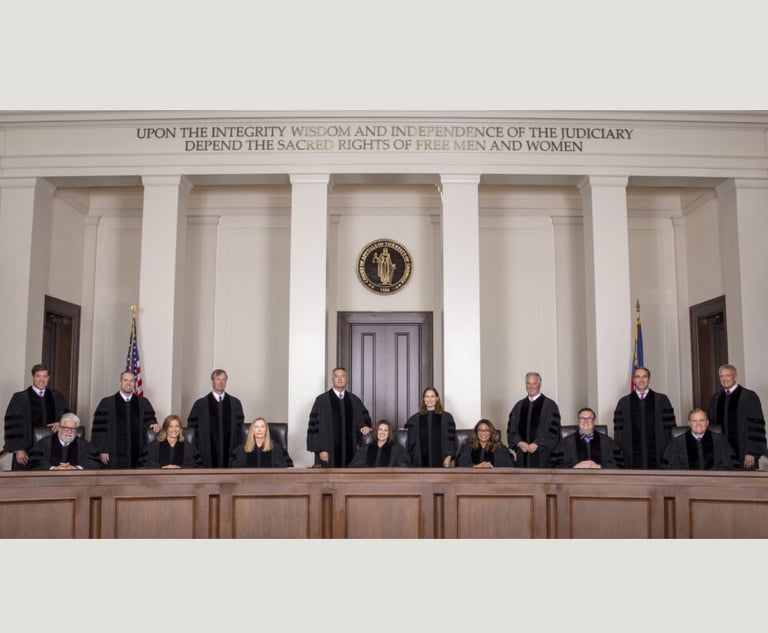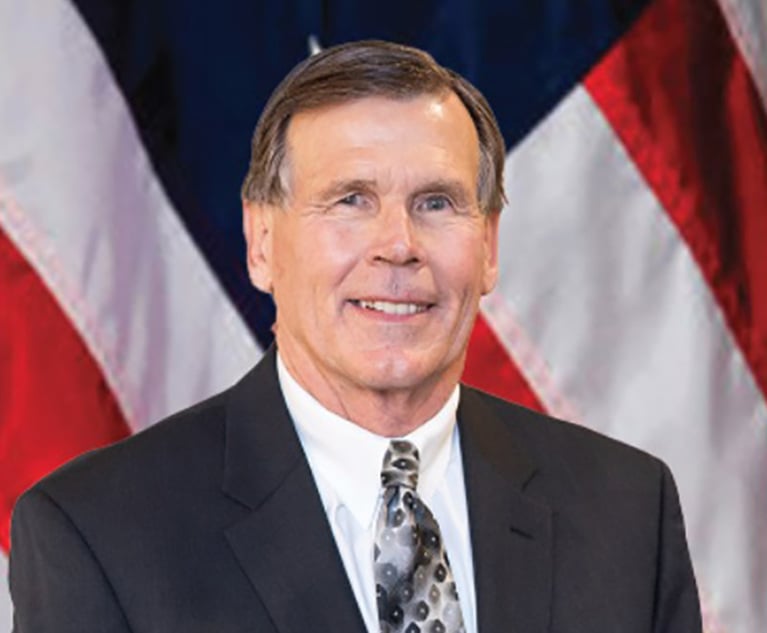 National Labor Relations Board, located at 1099 14th Street, NW, in Washington, D.C. April 16, 2012. Photo by Diego M. Radzinschi/THE NATIONAL LAW JOURNAL.
National Labor Relations Board, located at 1099 14th Street, NW, in Washington, D.C. April 16, 2012. Photo by Diego M. Radzinschi/THE NATIONAL LAW JOURNAL.Littler Mendelson's William Emanuel, Trump Pick for NLRB, Discloses Clients, Compensation
Uber, one of the Los Angeles shareholder's clients, has clashed with the labor board.Littler Mendelson's William Emanuel, one of President…
July 10, 2017 at 03:50 PM
5 minute read
The original version of this story was published on National Law Journal
Uber, one of the Los Angeles shareholder's clients, has clashed with the labor board.
Littler Mendelson's William Emanuel, one of President Donald Trump's nominees to the National Labor Relations Board, identified 49 former clients in a financial disclosure and said he would recuse himself, for up to a year, if any of the companies appear before the agency.
Emanuel wrote in a letter filed to the U.S. Office of Government Ethics that he will resign from his position at Littler Mendelson, where he made a base salary of $417,770 a year as a shareholder in the firm's Los Angeles office. For a period of one year, Emanuel, a Littler shareholder since 2004, said he will not participate personally and substantially in any particular matter involving specific parties in which a former client is a party or represents a party, unless authorized to participate.
Trump has been criticized for issuing waivers to White House staff and Cabinet agency officials, which would clear an official to work on cases where there is a conflict of interest. There have been a slew of waivers issued under the new presidential administration.
The clients identified by Emanuel include Uber Technologies Inc., which has several cases pending before the board, JPMorgan Chase Bank, MasTec Inc. and Nissan North America Inc. Uber this year fought the NLRB over the national scope of subpoenas. Emanuel also said he provided legal services to the law firm Irell & Manella. Littler Mendelson represents MasTec in the U.S. Supreme Court now, challenging an NLRB ruling in a dispute over workers who spoke with a local news station's consumer watchdog reporter.
Emanuel previously worked for the law firm Jones Day and participates in its benefit program, according to his federal disclosures. He will also not participate in any matter that has a direct effect on the firm to provide that benefit, unless a waiver is obtained. He also said upon confirmation he will resign from his board position of the Wine and Food Society of Southern California and not participate in any matters relating to that group.
Fellow NLRB nominee Marvin Kaplan, most recently counsel to the commissioner for the Occupational Safety and Health Review Commission, said in his disclosure letter he will not participate in any cases related to the Columbia University Hospital, where his wife is an employee.
The confirmation hearings for Kaplan and Emanuel are set for Thursday.
If confirmed, the NLRB will have the first Republican majority in a decade. Business groups have criticized the agency under the last administration and have expressed enthusiasm for a board that could bring more “balance.” Workers rights and union groups contend the GOP has politicized the agency, which often handles run-of-the-mill disputes between companies and unions.
Observers said the board could consider several high-profile issues once the new members are in place, including the examination of “joint employer” relationships, collective bargaining issues over “micro” units and whether graduate students should be considered employees with the right to unionize.
The House Education and Workforce Committee will hold a hearing Wednesday about a bill that spotlights an NLRB ruling on the joint employer issue. The bill would reverse the 2015 decision that made it easier to classify a business a joint employer, allowing contractors or franchisees to join union drives and the company susceptible to labor violation claims.
Meanwhile, other initiatives are in the works in Congress to rein in the board. The House Committee on Education and the Workforce cleared three measures that would alter federal labor law. The GOP sponsors say the measures will provide a balance to labor policies. The response in theory is to the perceived pro-union leanings of the Obama administration's board. Democrats, however, have denounced the bills as sabotaging the ability organize and collectively bargain for better wages.
The bills would revise the election procedures for forming “micro” bargaining units” and reverse policies that give labor unions access to employee contact information during organizing campaigns. One bill would clarify that the National Labor Relations Act does not apply to Native American tribes. Currently, the disputes are considered on a case-by-case basis.
This content has been archived. It is available through our partners, LexisNexis® and Bloomberg Law.
To view this content, please continue to their sites.
Not a Lexis Subscriber?
Subscribe Now
Not a Bloomberg Law Subscriber?
Subscribe Now
NOT FOR REPRINT
© 2025 ALM Global, LLC, All Rights Reserved. Request academic re-use from www.copyright.com. All other uses, submit a request to [email protected]. For more information visit Asset & Logo Licensing.
You Might Like
View All
Experts Not Foreseeing More Rules Governing Prosecutors' Actions After Georgia Court's Removal of DA From Election Case
8 minute read

3rd Circuit Nominee Mangi Sees 'No Pathway to Confirmation,' Derides 'Organized Smear Campaign'
4 minute read
Judge Grants Special Counsel's Motion, Dismisses Criminal Case Against Trump Without Prejudice
Trending Stories
- 1CFPB Alleges Berkshire Hathaway Subsidiary Originated Unaffordable Housing Loans
- 2Hogan Lovells Focuses on Corporate and Finance for 2025 Partner Promotions
- 3What I Wish I Knew Then: Richard Esposito
- 4In First Appeal of 2025, NY Top Court Eyes Ethics Watchdog, Cuomo's Book Deal
- 5Ex-Jenkens & Gilchrist Lawyer Convicted in Tax Shelter Scheme is Among Biden's Commutations
Who Got The Work
Michael G. Bongiorno, Andrew Scott Dulberg and Elizabeth E. Driscoll from Wilmer Cutler Pickering Hale and Dorr have stepped in to represent Symbotic Inc., an A.I.-enabled technology platform that focuses on increasing supply chain efficiency, and other defendants in a pending shareholder derivative lawsuit. The case, filed Oct. 2 in Massachusetts District Court by the Brown Law Firm on behalf of Stephen Austen, accuses certain officers and directors of misleading investors in regard to Symbotic's potential for margin growth by failing to disclose that the company was not equipped to timely deploy its systems or manage expenses through project delays. The case, assigned to U.S. District Judge Nathaniel M. Gorton, is 1:24-cv-12522, Austen v. Cohen et al.
Who Got The Work
Edmund Polubinski and Marie Killmond of Davis Polk & Wardwell have entered appearances for data platform software development company MongoDB and other defendants in a pending shareholder derivative lawsuit. The action, filed Oct. 7 in New York Southern District Court by the Brown Law Firm, accuses the company's directors and/or officers of falsely expressing confidence in the company’s restructuring of its sales incentive plan and downplaying the severity of decreases in its upfront commitments. The case is 1:24-cv-07594, Roy v. Ittycheria et al.
Who Got The Work
Amy O. Bruchs and Kurt F. Ellison of Michael Best & Friedrich have entered appearances for Epic Systems Corp. in a pending employment discrimination lawsuit. The suit was filed Sept. 7 in Wisconsin Western District Court by Levine Eisberner LLC and Siri & Glimstad on behalf of a project manager who claims that he was wrongfully terminated after applying for a religious exemption to the defendant's COVID-19 vaccine mandate. The case, assigned to U.S. Magistrate Judge Anita Marie Boor, is 3:24-cv-00630, Secker, Nathan v. Epic Systems Corporation.
Who Got The Work
David X. Sullivan, Thomas J. Finn and Gregory A. Hall from McCarter & English have entered appearances for Sunrun Installation Services in a pending civil rights lawsuit. The complaint was filed Sept. 4 in Connecticut District Court by attorney Robert M. Berke on behalf of former employee George Edward Steins, who was arrested and charged with employing an unregistered home improvement salesperson. The complaint alleges that had Sunrun informed the Connecticut Department of Consumer Protection that the plaintiff's employment had ended in 2017 and that he no longer held Sunrun's home improvement contractor license, he would not have been hit with charges, which were dismissed in May 2024. The case, assigned to U.S. District Judge Jeffrey A. Meyer, is 3:24-cv-01423, Steins v. Sunrun, Inc. et al.
Who Got The Work
Greenberg Traurig shareholder Joshua L. Raskin has entered an appearance for boohoo.com UK Ltd. in a pending patent infringement lawsuit. The suit, filed Sept. 3 in Texas Eastern District Court by Rozier Hardt McDonough on behalf of Alto Dynamics, asserts five patents related to an online shopping platform. The case, assigned to U.S. District Judge Rodney Gilstrap, is 2:24-cv-00719, Alto Dynamics, LLC v. boohoo.com UK Limited.
Featured Firms
Law Offices of Gary Martin Hays & Associates, P.C.
(470) 294-1674
Law Offices of Mark E. Salomone
(857) 444-6468
Smith & Hassler
(713) 739-1250








